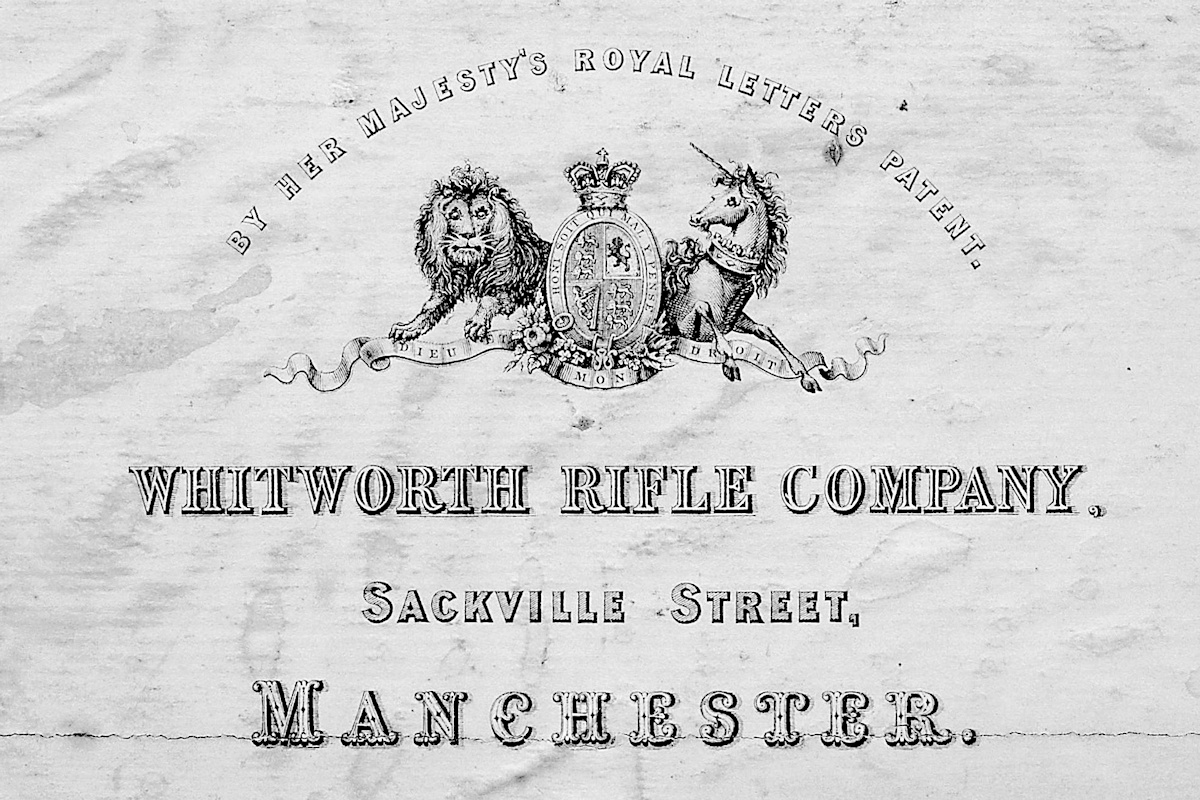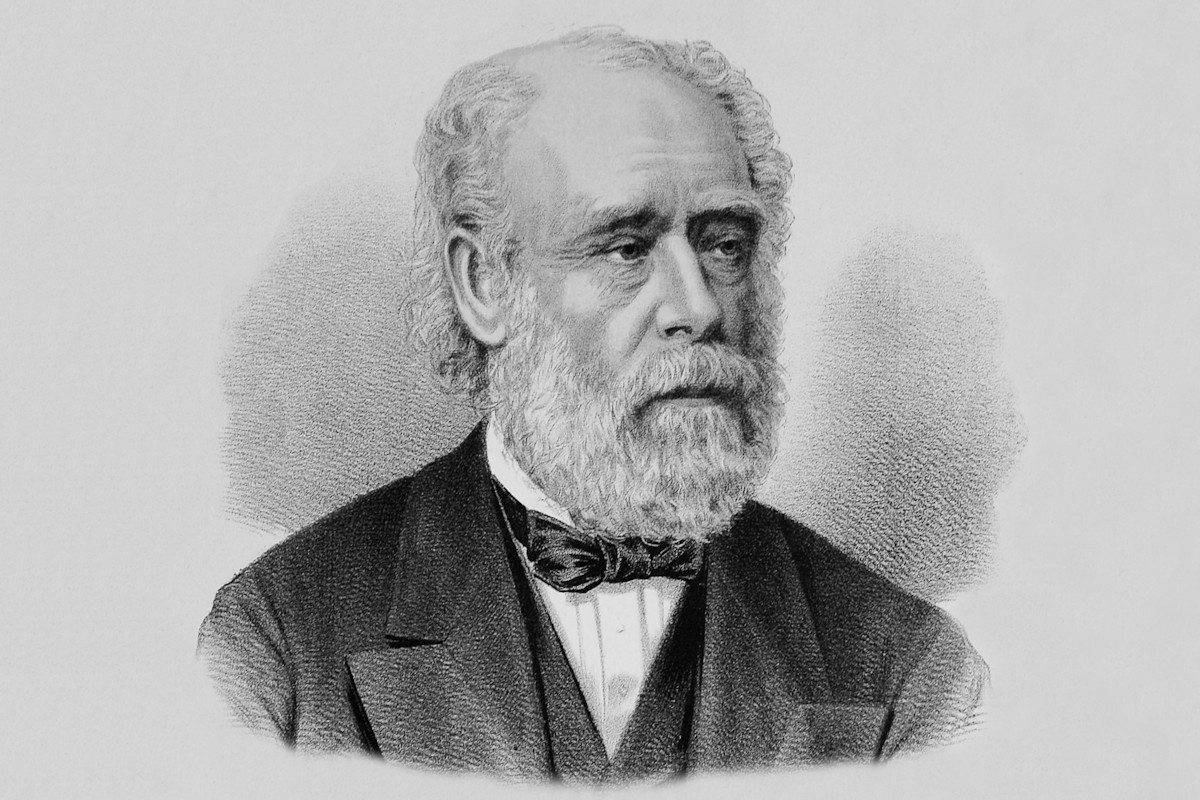Engineer > Great Exhibition > Firearms > Honours
In 1857 Mr. Whitworth was elected a Fellow of the Royal Society; the degree of LL.D. was conferred upon him by the Senate of Trinity College, Dublin; and he was, during the same year, honoured with the degree of D.C.L. by the University of Oxford. Mr. Whitworth exhibited a fine collection of engineers’ tools and of rifled ordnance and projectiles at the Exposition Universelle at Paris, in 1867; and in consideration of the valuable services rendered by him to the cause of industry and science, one of the five “Grand Prix” allotted to England was conferred upon him. During the visit of the late Emperor of the French to the camp at Châlons, in September, 1868, His Imperial Majesty was so pleased with one of Mr. Whitworth’s field-guns which was then being tried there, that he conferred upon that gentleman the distinction of the Legion of Honour. The Albert Gold Medal has also been awarded to Mr. Whitworth by the Council of the Society of Arts, “for the invention and manufacture of instruments of measurement and uniform standards by which the production of machinery has been brought to a degree of perfection hitherto unapproached, to the advancement of arts, manufactures, and commerce.” This medal was instituted for the purpose of rewarding distinguished merit in promoting arts, manufactures, or commerce; and on the roll of its recipients are such names as those of Sir Rowland Hill, Professor Faraday, and Sir Charles Wheatstone.
Mr. Whitworth was created a baronet in October, 1869, and in the same year founded the Whitworth Scholarships, for the assistance and encouragement of young students of mechanical and engineering science. In the previous year – March 18th, 1868 – Mr. Whitworth wrote to Mr. Disraeli, stating that it was his desire to promote the engineering and mechanical industry of this country by founding thirty scholarships, of the annual value of £100 each, to be applied for the further instruction of young men, natives of the United Kingdom, selected by open competition for their intelligence and proficiency in the theory and practice of mechanics and its cognate sciences. He proposed that these scholarships should be tenable, on conditions to be defined by a deed of trust regulating the administration of the endowment fund, during his life, and that thereafter the management of that fund, subject to the conditions specified therein, should vest in the Lord President of the Council, or other minister of public instruction for the time being. Mr. Whitworth’s munificent proposal was considered by the Lords of the Committee of Her Majesty’s Most Honourable Privy Council on Education, and he received a letter from their lordships, in which they accepted his generous offer, and intimated the readiness of their lordships to receive further suggestions from Mr. Whitworth as to the manner in which he proposed to carry out his scheme; at the same time, their lordships desired to be informed by Mr. Whitworth whether the Department could render him any assistance in carrying out his liberal intentions. Mr. Whitworth’s reply was to the effect that he wished the Lords of the Committee of Council on Education to undertake the examinations for these scholarships; that he would himself, with the aid of friends, be responsible for the examinations in the use of tools; and he submitted for their lordships’ consideration whether honours in the nature of degrees might not be conferred by some competent authority on successful students each year: thus creating a faculty of industry analogous to the existing faculties of divinity, law, and medicine. He expressed his opinion that such honours would prove a great incentive to exertion, and would tend considerably to promote the object in view. He also expressed a hope that the Government would provide the necessary funds for endowing a sufficient number of professors of mechanics throughout the United Kingdom. The general arrangements agreed upon for the first competition in May, 1869, are too copious to be given in detail here; but the chief points were that the scholarships should be open to all of Her Majesty’s subjects, whether of the United Kingdom, India, or the Colonies, who did not exceed twenty-six years (on the 4th of March, 1873, notice was given that after the examination of May, 1873, this limit would be fixed at twenty-two), and be held either for two or three years, as experience might prove to be advisable; that the candidates must be of sound bodily constitution; that examinations would be held in the following theoretical subjects:– Mathematics (elementary and higher); mechanics (theoretical and applied); practical plane and descriptive geometry, and mechanical and freehand drawing; physics and chemistry, including metallurgy. And also in the following handicrafts:– Smiths’ work, turning, filing and fitting, and pattern-making and moulding. No candidate would obtain a scholarship who did not show a satisfactory knowledge of all the following theoretical subjects:– Elementary mathematics, elementary mechanics, practical plane and descriptive geometry, and freehand drawing, together with the power to use one or more of the following classes of tools:– The axe, the saw and plane, the hammer and chisel, the file, or the forge. The object of Mr. Whitworth in devising the foregoing scheme was, while requiring a practical acquaintance with a few simple tools as a sine quâ non, to render the competition accessible on fairly equal terms to the student who combined some practice with his theory, and to the artisan who combined some theoretical knowledge with perfection of workmanship. As the scholarship scheme could only come into full operation by degrees, Mr. Whitworth proposed, from the fund ultimately available for the scheme, at once to create sixty exhibitions, of the value of £25 each, tenable until April, 1869, and to place them at the absolute disposal of the governing bodies of various educational institutions and towns, in order that they might award them to youths under twenty-five years of age, who might thus be aided to qualify themselves for the competition for the scholarships of £100 in May, 1869. This proposition met with the entire approval of the Committee of the Education Department, and was subsequently carried out. Some of the conditions in connection with the holding of the scholarships were altered in July, 1873. The princely nature of Mr. Whitworth’s gift will be at once apparent when it is borne in mind that a sum amounting to nearly £100,000 must be invested in order to produce the funds necessary for maintaining the scholarships of £3,000 per annum; whilst the benefit thus conferred on the cause of mechanical science is simply incalculable. Not only for a generation, but for ever, are these scholarships intended to exist; and the name of Sir Joseph Whitworth will be held in veneration by grateful students long after the memory of many other equally eminent contemporaries has died away. No donation at all approaching in magnitude to that of Sir Joseph Whitworth’s has ever been made for the furtherance of education in any shape; and it must be a source of profound satisfaction to Sir Joseph to know that he has contrived to raise himself to a position from which he can dispense, with a lavish hand, the means of enabling those who come after him to mount the ladder of fame, of which he, through sheer perseverance and intelligence, has succeeded in gaining the highest rung.
Sir Joseph Whitworth has on many occasions read papers before the various Scientific Societies, and his utterances have ever received the attention due to the words of one who is an acknowledged master of his subject. As a mechanician he stands alone, and for years past has been the standard authority on matters directly or indirectly connected with mechanics. He has devised and carried out inventions and improvements of a nature which has fairly astonished the world; and he has crowned a long and successful career by an act of munificence which will bring him the blessings of posterity. Nothing more need be said of Sir Joseph Whitworth, for even the outline of his career given here will suffice to bring the ready acknowledgment that he is entitled to rank in that third grade to which reference was made in the early portion of this sketch.
Sir Joseph married, first, in 1825, Fanny – who died in 1870 – youngest daughter of Richard Ankers, Esq.; and secondly, in 1871, Mary Louisa, widow of Alfred Orrell, Esq., of the Grove, Cheadle, and the Cottage, Grasmere.

